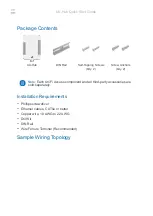Enhanced Modular Input/Output Subsystem (eMIOS)
MPC5565 Microcontroller Reference Manual, Rev. 1.0
Freescale Semiconductor
16-51
16.4.4.4.13
Center-Aligned Output Pulse-Width Modulation with Dead-time Mode
(OPWMC)
The following table lists the center-aligned output pulse-width modulation with dead-time mode settings:
This operating mode generates a center-aligned PWM with dead-time insertion in the leading- or
trailing-edge.
The selected counter bus must be running an up/down time base, as shown in
select the time base. Register A1 contains the ideal duty cycle for the PWM signal and is compared with
the selected time base. Register B1 contains the dead time value and is compared with the internal counter.
For a leading edge dead time insertion, the output PWM duty cycle is equal to the difference between
register A1 and register B1, and for a trailing edge dead time insertion, the output PWM duty cycle is equal
to the sum of register A1 and register B1. MODE[6] bit selects between trailing and leading dead time
insertion, respectively.
NOTE
Synchronize the internal prescaler of the OPWMCB channel with the MCB
channel prescaler and set them to the same value. This allows the A1 and B1
registers to represent the same time scale for duty cycle and dead time
insertion.
When operating with leading edge dead time insertion, the first match between A1 and the selected time
base clears the internal counter and switches the selected time base to the internal counter. When a match
occurs between register B1 and the selected time base, the output flip-flop is set to the value of the EDPOL
bit and the time base is switched to the selected counter bus. In the next match between register A1 and
the selected time base, the output flip-flop is set to the complement of the EDPOL bit. This sequence
repeats continuously.
When operating with trailing edge dead time insertion, the first match between A1 and the selected time
base sets the output flip-flop to the value of the EDPOL bit. In the next match between register A1 and the
selected time base, the internal counter is cleared and the selected time base is switched to the internal
counter. When a match occurs between register B1 and the selected time base, the output flip-flop is set to
the complement of the EDPOL bit and the time base is switched to the selected counter bus. This sequence
repeats continuously.
FLAG can be generated in the trailing edge of the output PWM signal when MODE[5] is cleared, or in
both edges, when MODE[5] is set.
Table 16-26. OPWMC Operating Mode
MODE[0:6]
Unified Channel OPWMC Operating Mode
0b0011100
Center-aligned output pulse-width modulation. FLAG set in trailing edge, trailing edge dead-time.
0b0011101
Center-aligned output pulse-width modulation. FLAG set in trailing edge, leading-edge dead-time.
0b0011110
Center-aligned output pulse-width modulation. FLAG set in both edges, trailing edge dead-time.
0b0011111
Center-aligned output pulse-width modulation. FLAG set in both edges, leading edge dead-time.
Summary of Contents for MPC5565
Page 18: ...MPC5565 Microcontroller Reference Manual Devices Supported MPC5565 MPC5565 RM Rev 1 0 09 2007...
Page 34: ...MPC5565 Reference Manual Rev 1 0 Freescale Semiconductor 15...
Page 35: ...MPC5565 Reference Manual Rev 1 0 16 Freescale Semiconductor...
Page 553: ...Flash Memory MPC5565 Microcontroller Reference Manual Rev 1 0 13 38 Freescale Semiconductor...
Page 559: ...SRAM MPC5565 Microcontroller Reference Manual Rev 1 0 14 6 Freescale Semiconductor...
Page 973: ...Preface MPC5565 Microcontroller Reference Manual Rev 1 0 21 36 Freescale Semiconductor...
Page 1153: ...Calibration MPC5565 Microcontroller Reference Manual Rev 1 0 B 8 Freescale Semiconductor...


















